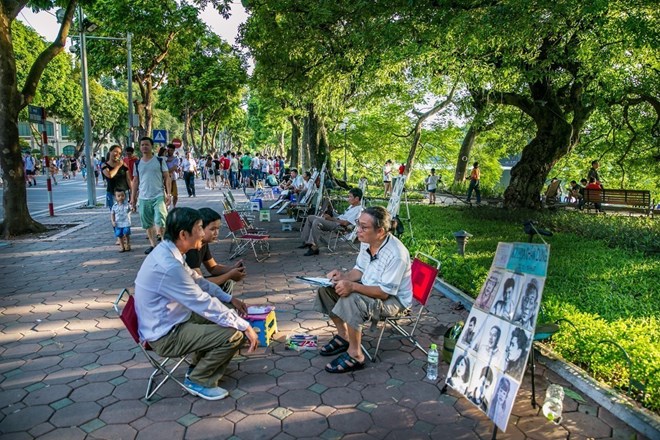
Tourist arrivals to the capital city of Hanoi topped 13.19 million in the first half of this year, up 10 percent year-on-year, pushing up revenue by 9.3 percent annually to over 39.2 trillion VND (1.74 billion USD).
Tourist
arrivals to the capital city of Hanoi topped 13.19 million in the first half of
this year (Photo: VNA
According to the Hanoi Tourism Department, the number of foreign
visitors to the capital city surpassed 3 million, marking a year-on-year
increase of 26 percent. Meanwhile, domestic visitors rose by 6 percent to more
than 10.1 million.
Foreign visitors were from about 190 countries and territories worldwide, especially
those with high affordability such as Western and Eastern Europe, Australia,
North America and Southeast Asia, with China, the Republic of Korea, Japan,
France and the US remaining key markets.
Director of the department Tran Duc Hai said Hanoi tourism has proved itself as
a major economic sector with stable growth, making effective contributions to
the city’s shift in economic structure.
Despite positive outcomes, Hanoi is also meeting difficulties in maintaining
its status as one of the most attractive destinations nationwide, including
limited promotion activities and lack of large-scale entertainment areas and
resorts to extend tourists’ stay.
Moreover, travel agencies are mostly on small scale with limited
competitiveness and workforce sometimes failing to meet demand.
In the foreseeable future, the sector will improve the quality of destinations;
develop cultural tourist products, focusing on cultural heritages and
high-quality craft villages; and increase linkage with other cities and provinces
with tourism potential.
Tapping relations with international organisations, cities and provinces
nationwide, the sector will seek support in building trademarks, marketing,
training human resources and connecting tourist products.
It also aims to build Hanoi into a safe, friendly and civilised tourist
destination.
This year, Hanoi is striving to welcome over 25.4 million tourists, including
5.5 million foreigners.
Source: VNA
Spanning thousands of hectares and winding gracefully along mountain slopes, hillsides, and riverbanks, the terraced rice fields of Lac Son District present a stunning and captivating beauty. This region, renowned for its remarkable terraced landscapes, is also the centre of Hoa Binh Culture known for numerous archaeological sites.
The life of Mong people in Hang Kia and Pa Co communes of Mai Chau district has improved much thanks to tourism development.
The man-made Hoa Binh Lake, with a water surface area of approximately 9,000 hectares and a capacity of 9.45 billion cubic meters, stretches over 200 kilometers from Hoa Binh to Son La provinces. With the goal of developing into a national tourism area, the Hoa Binh Lake tourism area is expected to not only become the largest tourism centre in the province but also one of the 12 key tourist destinations in the northern midland and mountainous region of Vietnam.
Da Bia hamlet, now Duc Phong, in Tien Phong commune, Da Bac district, was once almost isolated from the outside as the only way to the hamlet was to get a boat ride across the Hoa Binh reservoir. However, as its tourism potential has been unleashed, the hamlet has established itself as one of the most attractive destinations on the tourism map. It has even received the ASEAN Community-Based Tourism Awards in 2019.
In the first 9 months of 2024, Mai Chau district, Hoa Binh province welcomed over 684 thousand visitors to visit and relax. In which, over 516 thousand domestic visitors and more than 168 thousand international visitors. Total revenue from tourism is estimated at over 821 billion VND.
Da Bac district, bestowed with stunning landscapes, is developing ecological and resort tourism offerings. Several tourist sites, put into operation this year, has attracted throngs of high-spending and young domestic visitors.



